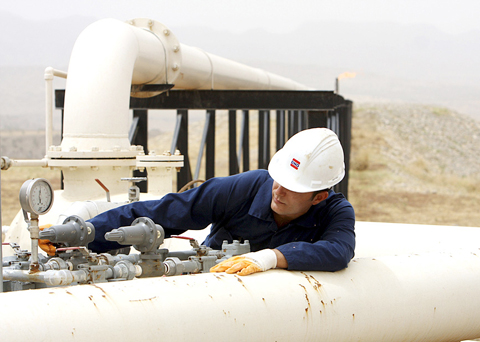British energy giant BP and China’s CNPC International Ltd were unveiled yesterday as the first foreign firms in decades to win contracts to invest in and develop Iraq’s war-battered energy sector.
The companies succeeded in their bid for the giant Rumaila oil field in southern Iraq, which has known reserves of 17.7 billion barrels, the oil ministry announced.
The contract was the first to be awarded in open tendering for six major oil fields and two gas fields, nearly four decades after former Iraqi president Saddam Hussein’s party nationalized the Iraqi energy sector.

PHOTO: REUTERS
The deals will provide the government with much-needed revenue as it struggles to rebuild the country after three wars and more than a decade of debilitating economic sanctions.
“These contracts are needed for the reconstruction of Iraq,” Prime Minister Nouri al-Maliki said at the opening of the bidding session in Baghdad. “They are for the benefit of Iraqis and the companies.”
The bidding process has attracted bids from 31 firms including US and European giants ExxonMobil and Shell, but also a swathe of Asian companies from China, India, South Korea and Indonesia.
The oil deposits, holding known reserves of 43 billion barrels of crude, are in southern and northern Iraq, while the gas concessions are west and northeast of Baghdad.
“Our principal objective is to increase our oil production from 2.4 million barrels per day to more than 4 million in the next five years,” Oil Minister Hussein al-Shahristani said in an interview with Iraqi public TV.
Increasing production to that level will, he said, pump an extra US$1.7 trillion into government coffers over the next 20 years.
Shahristani has said that only US$30 billion of that sum will go to the companies that have extracted the oil.
The rest “is a huge amount that would finance infrastructure projects across Iraq — schools, roads, airports, housing, hospitals,” he said, insisting that the country would retain control over its oil reserves.
For energy firms, the appeal is the opportunity to plant a foot in the country, their first chance to do so since the Baath party nationalized the Iraq Petroleum Company in 1972, seven years before Saddam took power.
“Thanks to sanctions and war, no company has wanted or been able to invest,” said Ruba Husari, an energy expert and the founder of the Web site iraqoilforum.com. “Today, the country is stable, in both its security and its institutions.”
Not all energy firms are happy, though, with the terms of the contracts being offered by Baghdad.
The foreign firms awarded deals will have to partner with Iraqi government-owned firms, principally the South Oil Company (SOC), and share management of the fields despite fully financing their development.
They will be paid a fixed fee per barrel, not a share of the profits.
“This raises the question of the profitability of the contract,” said a source involved in the bidding, who spoke anonymously. “The companies are the ones investing, but have a big problem with the fact that management will be shared.”

Four people jailed in the landmark Hong Kong national security trial of "47 democrats" accused of conspiracy to commit subversion were freed today after more than four years behind bars, the second group to be released in a month. Among those freed was long-time political and LGBTQ activist Jimmy Sham (岑子杰), who also led one of Hong Kong’s largest pro-democracy groups, the Civil Human Rights Front, which disbanded in 2021. "Let me spend some time with my family," Sham said after arriving at his home in the Kowloon district of Jordan. "I don’t know how to plan ahead because, to me, it feels

Poland is set to hold a presidential runoff election today between two candidates offering starkly different visions for the country’s future. The winner would succeed Polish President Andrzej Duda, a conservative who is finishing his second and final term. The outcome would determine whether Poland embraces a nationalist populist trajectory or pivots more fully toward liberal, pro-European policies. An exit poll by Ipsos would be released when polls close today at 9pm local time, with a margin of error of plus or minus 2 percentage points. Final results are expected tomorrow. Whoever wins can be expected to either help or hinder the

‘A THREAT’: Guyanese President Irfan Ali called on Venezuela to follow international court rulings over the region, whose border Guyana says was ratified back in 1899 Misael Zapara said he would vote in Venezuela’s first elections yesterday for the territory of Essequibo, despite living more than 100km away from the oil-rich Guyana-administered region. Both countries lay claim to Essequibo, which makes up two-thirds of Guyana’s territory and is home to 125,000 of its 800,000 citizens. Guyana has administered the region for decades. The centuries-old dispute has intensified since ExxonMobil discovered massive offshore oil deposits a decade ago, giving Guyana the largest crude oil reserves per capita in the world. Venezuela would elect a governor, eight National Assembly deputies and regional councilors in a newly created constituency for the 160,000

North Korea has detained another official over last week’s failed launch of a warship, which damaged the naval destroyer, state media reported yesterday. Pyongyang announced “a serious accident” at Wednesday last week’s launch ceremony, which crushed sections of the bottom of the new destroyer. North Korean leader Kim Jong-un called the mishap a “criminal act caused by absolute carelessness.” Ri Hyong-son, vice department director of the Munitions Industry Department of the Party Central Committee, was summoned and detained on Sunday, the Korean Central News Agency (KCNA) reported. He was “greatly responsible for the occurrence of the serious accident,” it said. Ri is the fourth person